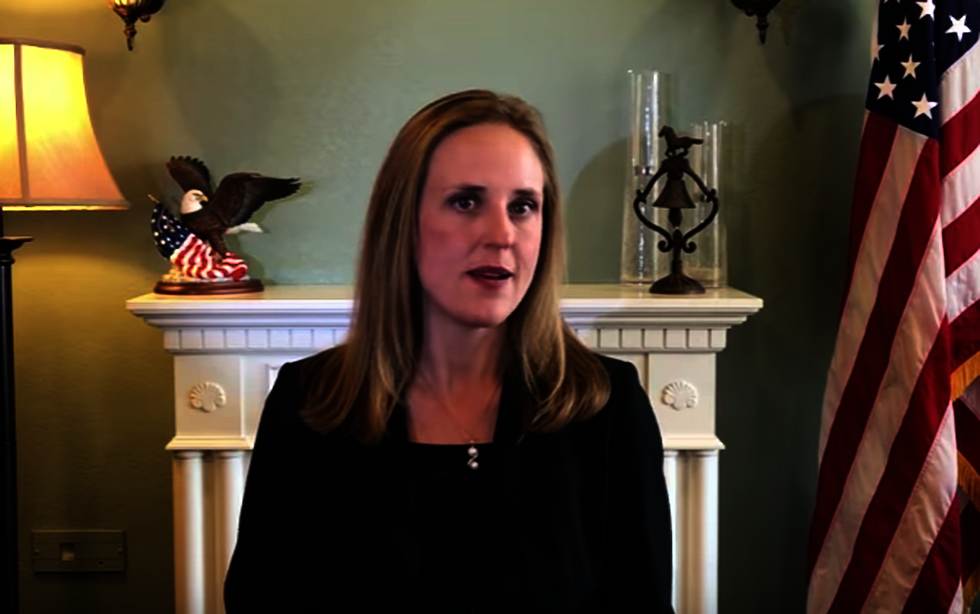
Candice Jackson, a 39-year-old Libertarian anti-feminist, is currently the de facto head of the Office of Civil Rights for the Department of Education. (Image: YouTube/Dinesh De Souza)

The Department of Education Secretary Betsy DeVos' new pick to head up the Office of Civil Rights is no friend to the feminist movement, nor is she a fan of race-based preferences in college admissions.
Candice Jackson, 39, is an attorney who graduated with honors from Stanford University. She got her law degree after graduating — with honors again — from the Pepperdine University School of Law. Since 2002, Jackson has been practicing law, specializing in both entertainment and politics.
She's now been hired as the deputy assistant secretary in the Office for Civil Rights. Since this position requires no senatorial approval, Jackson will act as head of the office until the position can be filled by an approved nominee.
But many would consider Jackson to be unqualified because of her views. Her past denotes a strong resistance to the ideas of racially based advantages or programs, and this stems from her past experiences at Stanford.
According to ProPublica, Jackson once wrote that she once suffered discrimination on campus because she was white. This discrimination occurred when she attempted to seek help with her advanced calculus class, where she "'gravitated' toward a section of the class that provided students with extra help on challenging problems," but she was rejected because it would only allow in minority students.
“I am especially disappointed that the University encourages these and other discriminatory programs,” she wrote in the Stanford Review. “We need to allow each person to define his or her own achievements instead of assuming competence or incompetence based on race.”
“As with most liberal solutions to a problem, giving special assistance to minority students is a band-aid solution to a deep problem,” she would later write. “No one, least of all the minority student, is well served by receiving special treatment based on race or ethnicity.”
Jackson stands opposed to race-based programs, and focuses more on individual liberty. She did a summer fellowship at the Ludwig von Mises Institute, a think tank of free market Libertarian scholars. While at the Mises Institute, she gave some editorial assistance to a book consisting of a collection of essays put together by Murray N. Rothbard, the institute's co-founder.
Rothbard opposed mandated schooling, as he wrote in his 1999 book, “Education: Free and Compulsory.” Rothbard claimed that it was a "criminal offense to [the] natures" of young children to force them to attend a State run school for the majority of their young lives. Rothbard further claimed that "the instruction has almost no effect on these children, many of whose hours of life are simply wasted because of the State’s decree.”
Rothbard also opposed the Civil Rights Act of 1964, calling it "monstrous," though not for racially prejudiced reasons.
"This horrendous invasion of the property rights of the employer is the source of all the rest of the ills, neocons and sellout Libertarians to the contrary notwithstanding," Rothbard wrote. "If I am an employer and, for whatever reason, I wish to hire only five-foot-four albinos. I should have the absolute right to do so. Period."
Jackson, a fan of Rothbard's work, wrote two papers analyzing his theories, having studied his work closely. She wrote of his 1982 book, “The Ethics of Liberty,” that it “shines as a monumental achievement, meeting Rothbard’s goal of setting forth ‘a positive ethical system … to establish the case for individual liberty.’ ”
In addition to her views on civil rights, according to her writings at Stanford, she also views the popular women's movement of modern feminism negatively.
In another article Jackson penned for the Review during her senior year, entitled, “How I Survived Stanford Without Entering the Women’s Center,” she condemned feminism on campus.“In today’s society, women have the same opportunities as men to advance their careers, raise families, and pursue their personal goals,” she wrote. “College women who insist on banding together by gender to fight for their rights are moving backwards, not forwards.”
In the article, she encouraged women to choose conservatism over feminism. “I think many women are instinctively conservative, but are guided into the folds of feminism before discovering the conservative community,” she wrote.
She concluded, “[t]he real women’s issues are conservative ones.”
These qualities do not sit well with Theodore Shaw, who led former President Barack Obama's transition team for civil rights at the Department of Justice, saying that her appointment “doesn’t leave me with a feeling of confidence with where the administration might be going.”
“I hope that she’s not going to be an adversary to the civil rights community and I hope that the administration is going to enforce civil rights laws and represent the best interests of those who are affected by civil rights issues,” he said.
Jackson is now in charge of a department of 550 full-time staffers who handle civil rights complaints in the thousands every year. If her past is any indication, the Office of Civil Rights may be processing these complaints far differently than it has in the past.